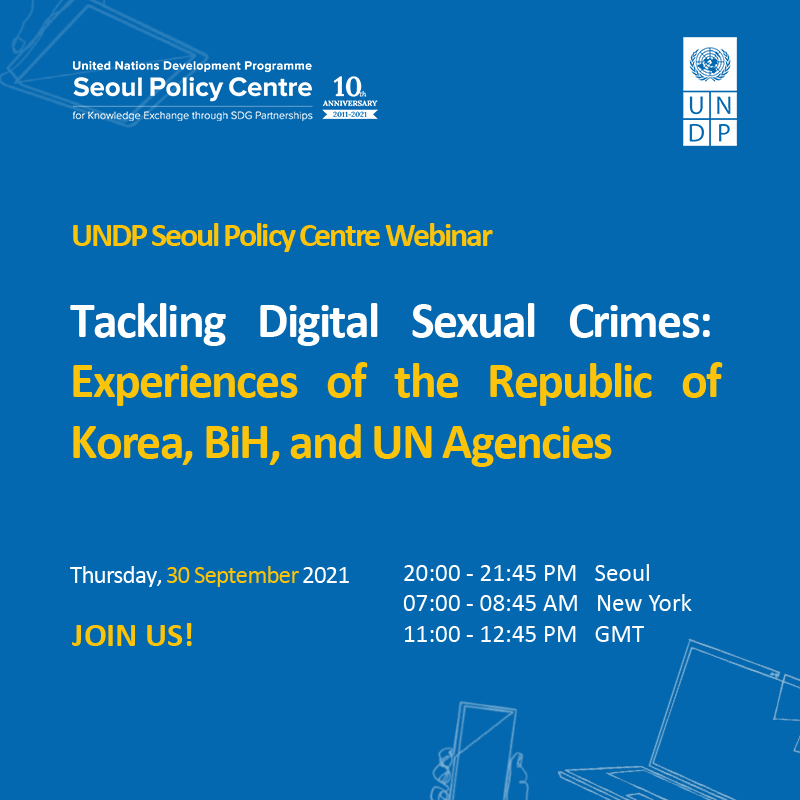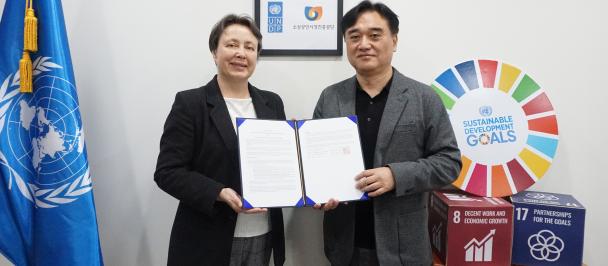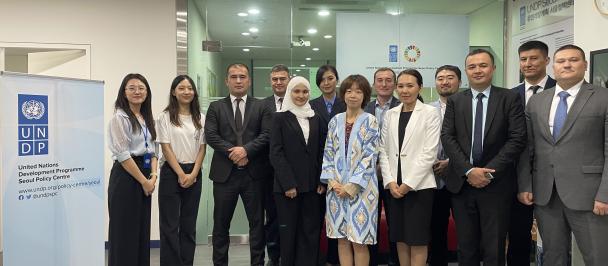UNDP Seoul Policy Centre (USPC) hosted its first-ever webinar on the topic of digital sex crimes that aimed to raise awareness on new trends in digital sex crimes, meaningful police and institutional responses and ways to overcome challenges. Experts from the Korean National Police Agency (KNPA), the Republika Srpska Women Police Officers Network in BiH and partner UN agencies were invited to share their experiences. The webinar, titled “Tackling Digital Sexual Crimes: Experiences of the Republic of Korea, Bosnia and Herzegovina (BiH) and UN Agencies”, was held on 30 September 2021,
The dialogue focused on tackling sextortion, a digital sex crime that occurs when someone threatens to distribute private materials in exchange for money or sexual favors. The Covid-19 pandemic has seen a rise in the exposure to sexual and gender-based violence, including but not limited to sextortion, with more and more people being connected to the internet. Worldwide, the lack of a strong anti-digital sex crimes regime often allows for loopholes for criminals to prepare modi operandi that makes it difficult to punish and track perpetrators.
Ms. Anne Juepner, Acting Director of USPC, remarked that fighting digital sex crimes “demands multi-stakeholder collaboration” and that this “webinar will provide a small yet significant venue [to share] practical ideas on fighting and preventing the occurrence of digital sex crimes in the future.” Mr. Yong-Hwan Lim, Director General for Foreign Affairs at KNPA, also emphasized that “cooperation among the Korean Police, UNDP and other international organizations and partners must continue and get stronger”. Ms. Raquel Lagunas, Head of the Gender Team at UNDP, pointed out that “digital crimes are real obstacles, not only to achieve gender equality but also the SDG 16 of providing access to justice for all and building inclusive institutions.” The webinar was moderated by Ms. Ahjung Lee, Governance Portfolio Manager at USPC, and Mr. Sofiene Bacha from the UNDP Rule of Law, Security and Human Rights Team.
Speakers emphasized the critical developments and responses needed to protect and support women and girls who remain vulnerable to sextortion. In response to this ‘shadow pandemic’, Mr. Jong Sang Choi, Director of the Cyber Investigation Bureau of the KNPA, explained that the Korean police established a special investigation task force dedicated to cybercrimes through enhanced cooperation and increased police training. KNPA reflected on lessons learned from prosecuting perpetrators of heinous acts to revise digital sexual crimes-related legislation and improve police responses.
Ms. Sanja Sumonja, President of the Women Police Officers Network in Republika Srpska, noted the significance of working towards a multi-stakeholder approach, which involves working with parents, schools and the national police and raising awareness and building diverse capacities needed to address sextortion on various levels.
Mr. Alexandru Caciuloiu, Cybercrime and Cryptocurrency Advisor and Regional Coordinator for South East Asia and the Pacific at UNODC (UN Office on Drugs and Crimes), specified the biggest threats to child exploitation occurring online, and the institutional measures needed to account for the difficult modi operandi of criminals.
Ms. Rachel Harvey, Regional Child Protection Advisor at UNICEF East Asia and Pacific Regional Office, shared the seven pillars of a multi-sectoral approach which requires cooperation among the private, education, social welfare, criminal justice and police sectors across borders to ensure that no child suffers from online abuse and exploitation.
Questions from the audience ranged from guidance on reinforcing international cooperation, enforcing preemptive measures and encouraging contributions by internet companies and their intermediaries to stop abuse. The webinar concluded with the Director of USPC underscoring the importance of paying vigilant attention to digital sex crimes and strengthening collaborative efforts to tackle them.

 Locations
Locations




